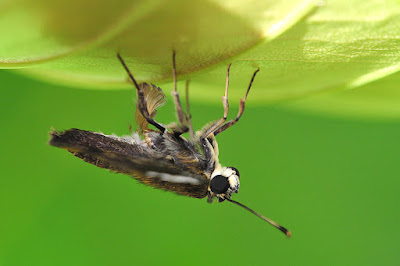Butterfly of the Month - April 2023
The White Banded Flat (Celaenorrhinus asmara asmara)
A White Banded Flat sunbathing on a leaf of the Fishtail Palm
All too soon, the fourth month of 2023 has come and almost gone. The month of April belongs to the astrological sign Aries. For those born between 21 March and 19 April, your zodiac sign is Aries. We featured Capricorn, Aquarius and Pisces in the preceding Butterfly of the Month blogposts and will now move into the next in the series. The 12 zodiac signs are Aries, Taurus, Gemini, Cancer, Leo, Virgo, Libra, Scorpio, Sagittarius, Capricorn, Aquarius, and Pisces.
Aries (♈︎) (Greek: Κριός, romanized: Kriós, Latin for "ram") is considered the first astrological sign in the twelve signs of the zodiac. Aries has its genesis from the God of War, Ares. He is described as, "murderous, bloodthirsty, troublemaker for mortals; and, strangely, a coward". The Roman name for Ares was Mars, which is the ruling planet of Aries.
People born under the sign of Aries are known to be aggressive leaders, with the characteristics of a street-fighter and often too belligerent for some. They are bold, independent, charismatic, confident, assertive, and powerful. This boss-like zodiac sign is usually in the lead to get things done; they are certainly not procrastinators. Aries people are full of energy and have a fearlessness about them that easily combines with their leadership abilities to make things happen.
Aries are brave in all aspects of life. When it comes to facing the unknown and taking on new challenges, Aries are extremely capable. They take on challenges without wavering and enjoy finding new thrills. However, on the negative side, they can be arrogant and confrontational and an ineffective team player. In a world of collaborations and partnerships, Aries personalities may be rather out of place.
For the month of April 2023, our feature butterfly of the month is the White Banded Flat (Celaenorrhinus asmara asmara). A recent re-discovery in early 2011, the White Banded Flat belongs to the genus Celaenorrhinus which comprises about 80 species across Asia, Africa and America. Only 10 species are known to fly in Malaysia and Singapore, and the White Banded Flat is the single representative of the genus in Singapore.
The genus is characterised in that the males have an erectile hair tuft on the hind tibia. The White Banded Flat is thus far known only from a handful of locations on Pulau Ubin. It is considered very rare, but is also very local and regularly observed at its preferred sites on Pulau Ubin. Considering the very limited sites where this species can be found, and based on the IUCN criteria, it has been classified as a Critically Endangered species in the Singapore Red Data Book 3rd Edition.
A White Banded Flat puddling on a rock
The White Banded Flat is described as uncommon but widely distributed in the lowlands of Malaysia. On the forewing above the cell spot is not continued above the radius and there is no white spot in cell 1b. The discal fascia is white and does not extend below vein 2. There are some obscure darker brown markings on the hindwings above.
Typical pose of the Pyrginae or "Flats" - perched on the underside of a leaf with its wings opened flat
Thus far, the caterpillar host plant of the White Banded Flat has yet to be ascertained in Singapore. The known host plants from other sources include Clerodendron chinense (Lamiaceae), Justicia gendarussa (Acanthaceae) and Jasminum nervosum (Oleaceae). These plant species should be looked for in the habitat where this species frequents on Pulau Ubin.
Text by Khew SK : Photos by Chng CK, Khew SK, Loh MY, Tea Yi Kai and Anthony Wong











No comments:
Post a Comment